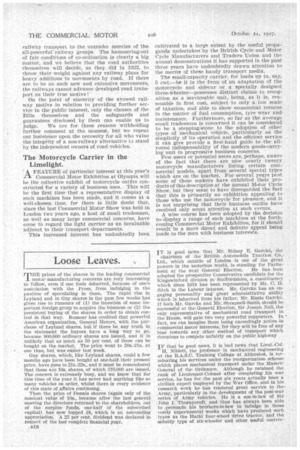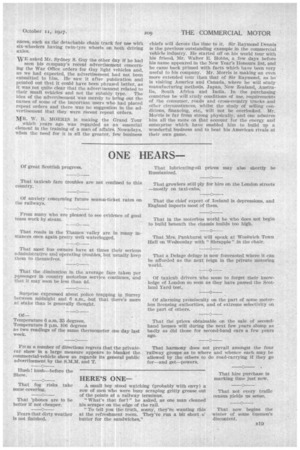Loose Leaves.
Page 44

Page 45

If you've noticed an error in this article please click here to report it so we can fix it.
THEprices of the shares in the leading commercial motor•manufacturing concerns are very interesting to follow, even if one feels debarred, because of one's association with the Press, from indulging in the pastime of speculating in them. The rapid rise in Leyland and in Guy shares in the past few weeks has given rise to rumours of (1) the intention of some important foreign group to.acquire the business or (2) the persistent buying of the shares in order to obtain control in that way. Rumour has credited that powerful 'American organization, General Motors, with the purchase of Leyland shares, but if there be any truth in the. statement the buyers have a long way to go, because 900,000 ordinary shares are issued, and it is unlikely that as much as 50 per cent. of these can be bought on the market. The price went to 20s.-21s. at one time, but was easier last week.
Guy shares, which, like Leyland shares, could a few months ago have been bought at one-halftheir present price, have gone to 21s.-22s., and it must be remembered that these are 10s. shares, of which 570,000 are issued. The concern is extremely busy, and we know that for this time of the year it has never had anything like so many vehicles on order, whilst there is every evidence of this state of affairs continuing.
Then the price of Dennis shares (again only of the nomioal value of 10s., because after the last general. meeting the directors returned to the shareholders, out of the surplusfunds, one-half of the subscribed capital) has now topped £8, which is an astounding appreciation. A 25 per cent, dividend was declared in respect of the last complete financial year. • s18 IT is good news that Mr. Sidney E. Garcke, the chairman of the British Automobile Traction Co., Ltd., whieh outside of London is one of the great powers in the motorbus world, is standing for Parliament at the next General Election. He has been adopted the prospective Conservative candidate for the Kingswinford division in Staffordshire, a constituency which since 1918 has been represented by Mr. C. R. Sitch in the Labour interest. Mr. Garcke has an engaging personality and great administrative ability which is inherited from his father, Mr. Emile Garcke. If both Mr. Garcke and Mr. Shrapnell-Smith should be successful at the General Election, Sir Joseph Nall, the only representative of mechanical road transport in the House, will gain two very powerful supporters. In fact, we can imagine them being exceedingly active in commercial motor interests, for they will be free of any bias towards any other method of transport which threatens to compete unfairly on the public highway
IF that he good new it is had news that Lieut.-Col.
H. Niblett, the professor in mechanical engineering at the R.A.S.C. Training College at Aldershot, is terminating his services under the reorganization scheme which places mechanical transport under the MasterGeneral of the Ordnance. Although he retained tile rank of Lieutenant-Colonel after completing his war service, be has for. the past six years actually been a civilian expert employed by the War Office, and in his research work he has rendered great service to theArmy, particularly in the development of the post-war series of Army vehicles. He is a son-in-law of Sir .Tolin I. .Thornycroft, and thus has always been able to .persuade his . brothers-in-law to indulge in those costly experimental works which have produced such types as the Hathi four-wheel drive tractor, and the subsidy type of six-wheeler and other useful contriv ances, such as the detachable chain track for use with Six-wheelers having twin-tyre wheels on both driving axles.
WE asked Mr. Sydney S. Guy the other day if he had seen his company's recent advertisement concerning the War Office orders for Guy light vehicles and, as we had expected, the advertisement had not been submitted to him. He saw it after publication and pointed out that it could have been phrased better, as it was not quite clear that the advertisement related to their small vehicles and not the subsidy type. The idea of the advertisement was merely to bring out the names of some of the important users who had placed repeat orders and there was no suggestion in the advertisement that they were recent repeat orders.
MR. W. R. MORRIS is making the G;rand Tour which iears ago was regarded as an essential element in the training of a man of affairs. Nowadays, when the need for it is all the greater, few business chiefs will devote the time to it. Sir Raymond Dennis is the previous outstanding example in the commercial vehicle industry. He started off on his world tour with his friend, Mr. Walter E. Hobbs, a few days before his name appeared in the New. Year's Honours list, and he came back primed with facts which have been very useful to his company. Mr. Morris is making an even more extended tour than that of Sir Raymond, as he: is visiting America and Canada, where he will study . manufacturing methods, Japan, New Zealand, Australia, South Africa anti India. In the purchasing countries he will study conditions of use, requirements of the consumer, roads and cross-country tracks and other circumstances, whilst the study of selling conditions, financing, etc., will not be overlooked. Mr. Morris is far from strong physically, and one admires him all the more on that account for the energy and entetprise which have enabled him . to build up a wonderful business and to beat his American rivals at their own game.




















































































































